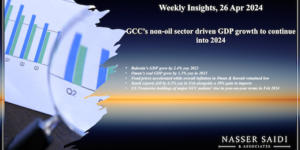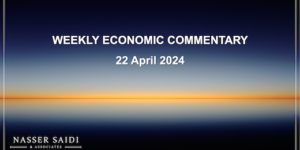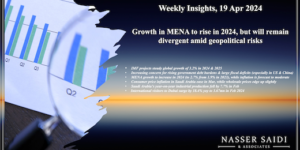Markets
International stock markets were downbeat over Greece’s fiscal situation and contagion to other eurozone countries sparked by downgrades of Greece and Portugal debt: China witnessed the worst run of losses in 16 months, while India’s Sensex shed about 1.8% on Wednesday, bringing the index close to its lowest in 6 weeks. Weak performance was also visible in the regional markets, with both main UAE indices down close to 2%. The euro dropped to a one-year low against the dollar while both oil and gold prices rose.
Global Developments
America:
- The FOMC meeting held last week left the policy rate unchanged, as expected, with a modest upgrade in its assessment of growth and unemployment. Any hint of a rate increase was postponed to the indefinite future.
- Initial claims were down by 11k to 448k in the week ended Apr 24, while the 4-week average of initial claims remained high at 463k.
- The advance GDP estimate for Q1 2010 registered a growth of 3.2%, with the inventory investment cycle contributing to almost half the growth.
Europe:
- Greece’s crisis deepened as the government bond markets plunged and the government said it needs EUR 9 billion before March 19th. A joint program of the IMF and EU worth 120 billion euro in exchange for draconian austerity measures has been approved by the Greek government.
- Inflation picture in Germany remains very benign and latest wage deals certainly do not pose any inflationary as the preliminary figure rose 0.1% mom in April. Eurozone inflation however edged up in April at 1.5% yoy.
- French Consumer Confidence fell unexpectedly from -34in March to -37 in April, while it edged up almost two points in Italy to 107.9.
- Eurozone’s unemployment rate remained unchanged at 10.0% in Mar while Germany’s unemployment rate fell to 7.8% in April (Mar: 8.0%). Germany’s unemployment rate is now at its lowest level since Jan09.
Asia and Pacific:
- Korea’s Q1 real GDP grew by 1.8% qoq seasonally-adjusted, up from 0.2% qoq in Q4. Growth was broad based with exports and government consumption the main drivers.
- Among Japan’s host of data releases, the most striking was industrial production which rose only 0.3% mom in March, not recovering much from Feb’s dip of -0.6%. This took Q1 2010 IP growth to 6.7% (Q4 2009: 5.9%).
- Although China has neither moved rates nor its currency, it is taking measures to rein in lending—mostly through edict and tighter regulation, which will reduce the global liquidity and affect equity markets.
Bottom line: The US GDP figure confirms that a broad based recovery is underway there while in emerging Asia data continue to surprise on the upside. Europe, so far the laggard, risks another dip as a result of the Greek crisis. The agreement reached today is just a first step in a painful fiscal retrenchment process which will take a few years to complete in the midst of a deep recession.
Regional Developments
- said Sunday it revoked the securities business license of The 33rd Preparatory Meeting for GCC Ministries of Finance urged the finalization of the study on VAT, to be implemented later by 2012. There was no agreement regarding the Customs Union revenue sharing scheme, nor on the establishment of a joint development bank for which a further study was decided.
- The IMF highlighted that the Gulf oil producers and other countries in the Middle East should take advantage of lower inflation rates and maintain counter-crisis fiscal stimulus measures to boost growth. Stimulus measures should also remain in place to offset a sharp slowdown in bank credit because of debt default problems and a downturn in the real estate sector, especially in the GCC.
- The GCC conventional bond market recorded a poor performance in Q1 2010 (falling by some 70% in value from the average of the previous three quarters to $3.4bn) amid Dubai-linked and broader sovereign debt fears.
- The Saudi bourse watchdog fined two listed firms, Allied Cooperative Insurance Group and Saudi Real Estate Co., for not informing quickly the regulator on management changes and for disclosing their earnings late.
- UAE and Oman signed an agreement to interconnect their power grids. Oman government will invest OMR 1bn in the coming 5 years in new power generation, transmission & distribution companies, desalination.
- Saudi inflation for March edged up to 4.7% as high rents and economic recovery triggered by strong oil prices start to add upward pressure on inflation but the rate is expected to remain stifled due to slow bank credit.
- Saudi Arabia awarded development contracts worth SAR20.9 bn in Q1 2010 as part of the five-year infrastructure program. This however was a significant drop from Q1 2009’s SAR 40.6bn.
Market Intelligence on the UAE
- Credit granted by the 24 national banks and 28 foreign units to the private sector dropped from Dh630.7 billion at the end of 2008 to Dh607.09bn at the end of 2009, the Central Bank wrote in its bulletin. Loans to the government rose by close to 27% from Dh72.2bn to Dh91.8bn while credit to other public sector institutions climbed by nearly 28% from Dh70.1bn to Dh89.9bn.
- Nakheel said creditors had started signing deals to receive full payment in the form of 40% cash and 60% newly issued tradable security yielding a 10% annual return.
- A Central Bank circular specified that banks “are not required to provision their related exposure to Dubai World.” Hence losses, if any, will likely be reflected in the balance sheet in Q3.
- The Ras Al Khaimah Investment Authority (Rakia) has issued 263 business licenses during the first quarter of 2010, a growth of 75% yoy, to a total of 2,834 registered companies.
- Dubai Airports recorded a 21.8% rise in passenger traffic for March, with more than 3.9mn travellers, compared with the 3.2mn in Mar09. Passenger traffic was up 20.4% and cargo volumes 26.4% in Q1 2010.
- According to the Economy Minister Sultan bin Saeed Al Mansouri, growth will reach 2.5% this year as the government spends its oil revenues on infrastructure projects to prop uo the economy.
- Inflation rose for the first time in four months to 0.68% yoy, as the education component registered its biggest yoy rise, 10.46%.





